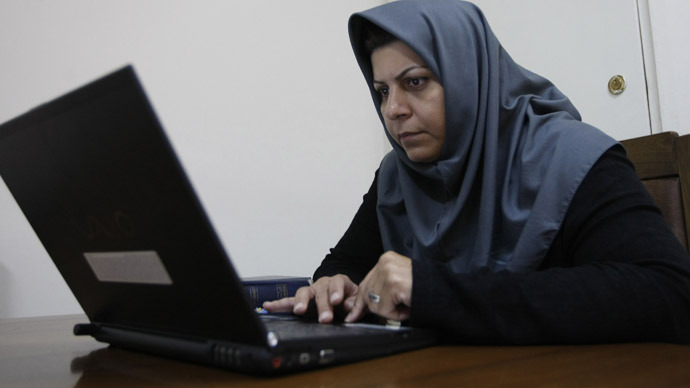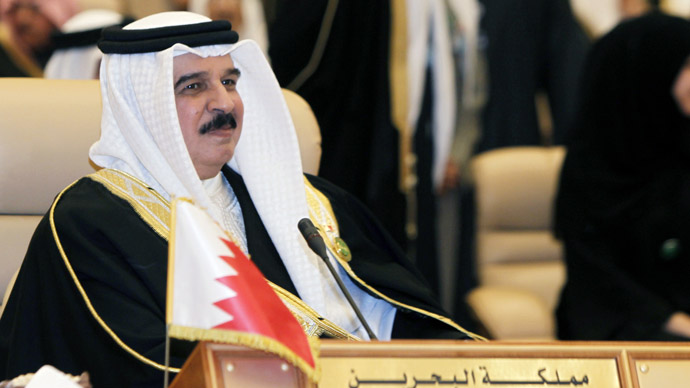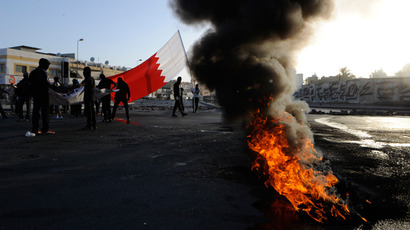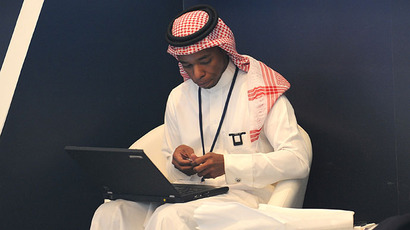US Gulf allies crack down on Internet freedoms

Gulf Arab allies of the US have come under fire for introducing a series of draconian measures that limit Internet freedoms. The measures restrict content on social media sites, making “offending” posts punishable by extensive jail sentences.
Saudi Arabia, Qatar, the United Arab Emirates, Kuwait and Bahrain
have tightened controls on Internet freedoms recently, targeting
social media and phone applications alike in their communications
crackdown.
Across the Gulf, dozens of journalists and social media users
have been arrested since the beginning of the year for being in
violation of the uncompromising national laws.
Punishments include deportation and lengthy prison sentences for
crimes such as making derogatory comments about the government
“in bad faith,” and offending religion and family values.
In Saudi Arabia last month, top cleric Sheikh Abdul Latif Abdul
Aziz al-Sheikh warned citizens against using Twitter, stating
that those who use social media sites “have lost this world
and the afterlife.”
Addressing gross human rights abuses among Washington’s Gulf Arab
allies is problematic for the Obama Administration, as US
Military bases in the region form what RT’s Marina Portnaya
describes as a “strategic envelope around Iran.”
“The US is in the midst of a major military buildup in the
Persian Gulf. More warships, additional attack aircraft, and most
recently a laser weapon system have been deployed to the region.
In 2010, the US struck a 10-year, $60 billion weapons deal with
Saudi Arabia, and despite Bahrain’s bloody crackdown on
pro-democracy protesters, the US has reportedly continued to
provide tens of millions of dollars worth of weapons, ammunition,
vehicle parts and communication equipment to the country,”
Portnaya reported.
Colin Cavell, author of 'Exporting ‘Made in America’ Democracy,'
argues that Washington has a policy of silence regarding human
rights abuses committed by Persian Gulf monarchies.
“The Al Khalifa family, which has been running Bahrain for 230
years, jails people, tortures people, murders people, and there
are no repercussions from the United States. We keep
selling the Bahraini government armaments, all sorts of equipment
that they utilize to enforce their oppression,” he says.
Cavel believes that a lack of media coverage in the United States
has left most American unaware that Washington is providing
support for Bahrain’s “autocratic regime.”
Saudi Arabia
After threatening to ban messaging applications like Skype and
WhatsApp, Saudi Arabia's telecom regulator has chosen a new
target: The web-based communication app Viber. The instant
messaging application has been blocked since June 5.
“The Viber application has been suspended... and the
[regulator] affirms it will take appropriate action against any
other applications or services if they fail to comply with
regulatory requirements and rules in force in the kingdom,”
the Communications and Information Technology Commission (CITC)
said in a statement.

Viber allows its users to
text, call and send photos and video messages worldwide using a
3G or Wifi connection, and boasts over 200 million subscribers
worldwide.
In March, the CITC warned mobile providers in the Kingdom that if
they could not find ways to monitor encrypted messaging and VOIP
applications, then they would be blocked, according to local
media. The commission then issued a statement saying that “it
would take suitable measures against these apps and
services,” in its push for greater control over the Internet.
The Saudi government has also begun arresting Twitter users for
posts to their accounts. Local media reports that the government
is looking into ending anonymity for Twitter users in the country
by making users register their identification documents.
Qatar
Despite its status as a regional media hub, the emirate state is
considering a new cybercrime law that would widen government
control over news websites and online commentaries.
If passed, the law would enable the government to punish websites
or social media users for violating “the social principles or
values,” or for publishing “news, photos, audio or visual
recordings related to the sanctity of the private and familial
life of persons, even if they were true, or infringes on others
by libel or slander via the Internet or other information
technology means,” Qatar News agency reported.

United Arab Emirates
At the end of 2012, the UAE passed a sweeping new cybercrime law:
Anyone found guilty of criticizing the country’s rulers or
institutions online may be jailed or deported. The law attracted
widespread opposition, with legal consultants warning it is broad
enough to penalize anyone caught posting allegedly offensive
comments against the state.
This law has been used to jail citizens for Twitter posts over
the past few months. In May, the UAE appeals court sentenced
Abdullah Al-Hadidi to 10 months in jail for tweeting details of
the trial of his father.
He was arrested on March 22 on charges of disseminating
information on Twitter “in bad faith.” The court ruled
that he wrote false details of a public hearing that, along with
his father, involved 93 other people accused of plotting to seize
power in the Gulf Arab state.
Kuwait
The government has arrested dozens of activists and at least six
journalists in 2013 in the constitutional emirate, often
described as the most liberal country in the region.
In March, Twitter user Hamed Al-Khaledi was sentenced to two
years in prison for allegedly insulting the ruler of the Gulf
nation. Others have been accused of “threatening state
security” or “offending religion.”
In April, a Kuwaiti court sentenced former parliamentarian and
opposition leader Mussallam al-Barrak to five years in prison for
remarks deemed critical of the ruler of the state, which he made
last year at a public rally.
Kuwait has been a member of the International Covenant on Civil
and Political Rights (ICCPR) since 1996, which protects the right
to freedom of expression, including peaceful criticism of public
officials.

Bahrain
The Bahraini government has been trying to suppress an ongoing
uprising by introducing stricter penalties. In April, the
government passed a law making it illegal to insult the Gulf
state's King Hamad bin Issa al Khalifa, or its national symbols.
Recently, Bahraini blogger and activist Ali Abduleman was granted
asylum in the UK after two years in hiding. Adbuleman claims he
was persecuted by the government “for exercising the right to
express his opinions” on his website. The Bahraini government
claims he was tried for “inciting and encouraging continuous
violent attacks against police officers” and conspired to spread
“false and inflammatory rumors.”
In May, 62-year-old Bahraini protester Abdulla Sayegh was
sentenced to three months in prison for hanging a national flag
from his truck during a 2011 rally. The same month, six Twitter
users were jailed for allegedly offensive comments about the
country’s ruler deemed to be 'abusing freedom of expression.’
According to prosecutors, they posted comments that undermined
“the values and traditions of Bahrain's society towards the
king."
One of the best-known human rights abuse cases in Bahrain is that
of activist Nabeel Rajab, who was sentenced to three years in
jail in August 2012 on charges of ‘participating in an illegal
assembly’ and ‘calling for a march without prior notification.’
He openly criticized the country’s regime on RT for Julian
Assange’s show The World Tomorrow.
The country has witnessed mass protests led by the kingdom’s
majority Shiites against the minority Sunni-led government for
two years. The Shiite demonstrators call for a transfer to a
democratic system, and complain of discrimination in jobs and
government. Their loyalty is in turn questioned by the ruling Al
Khalifa monarchy, which has been in power for decades.














